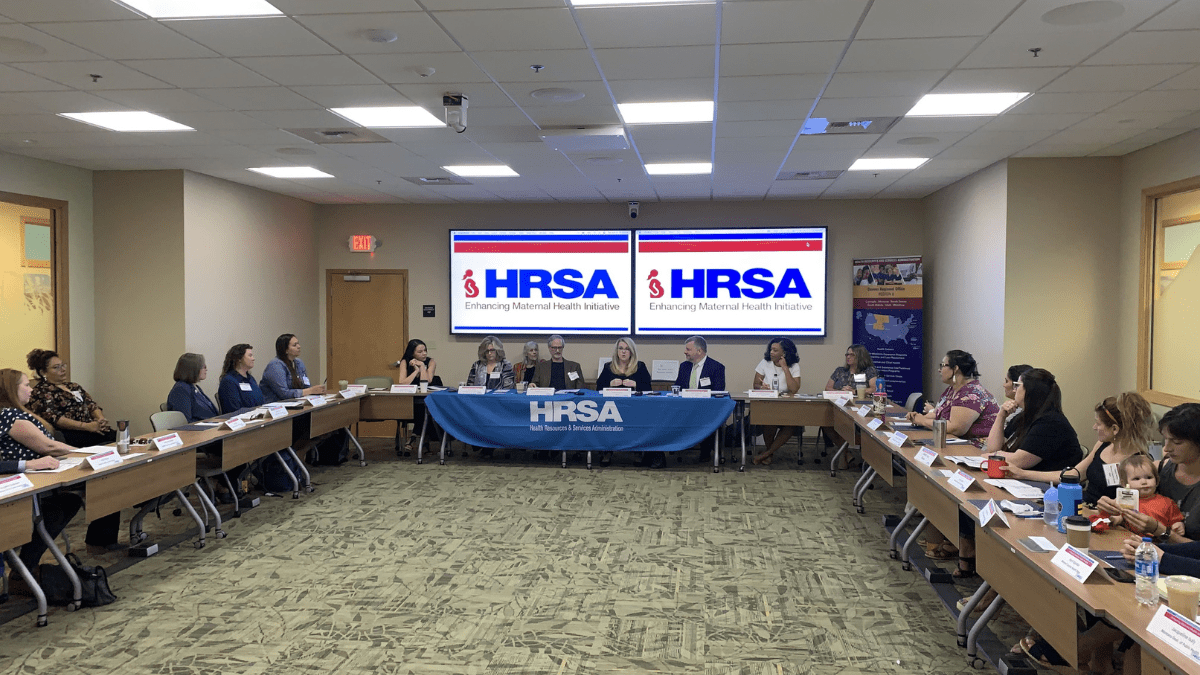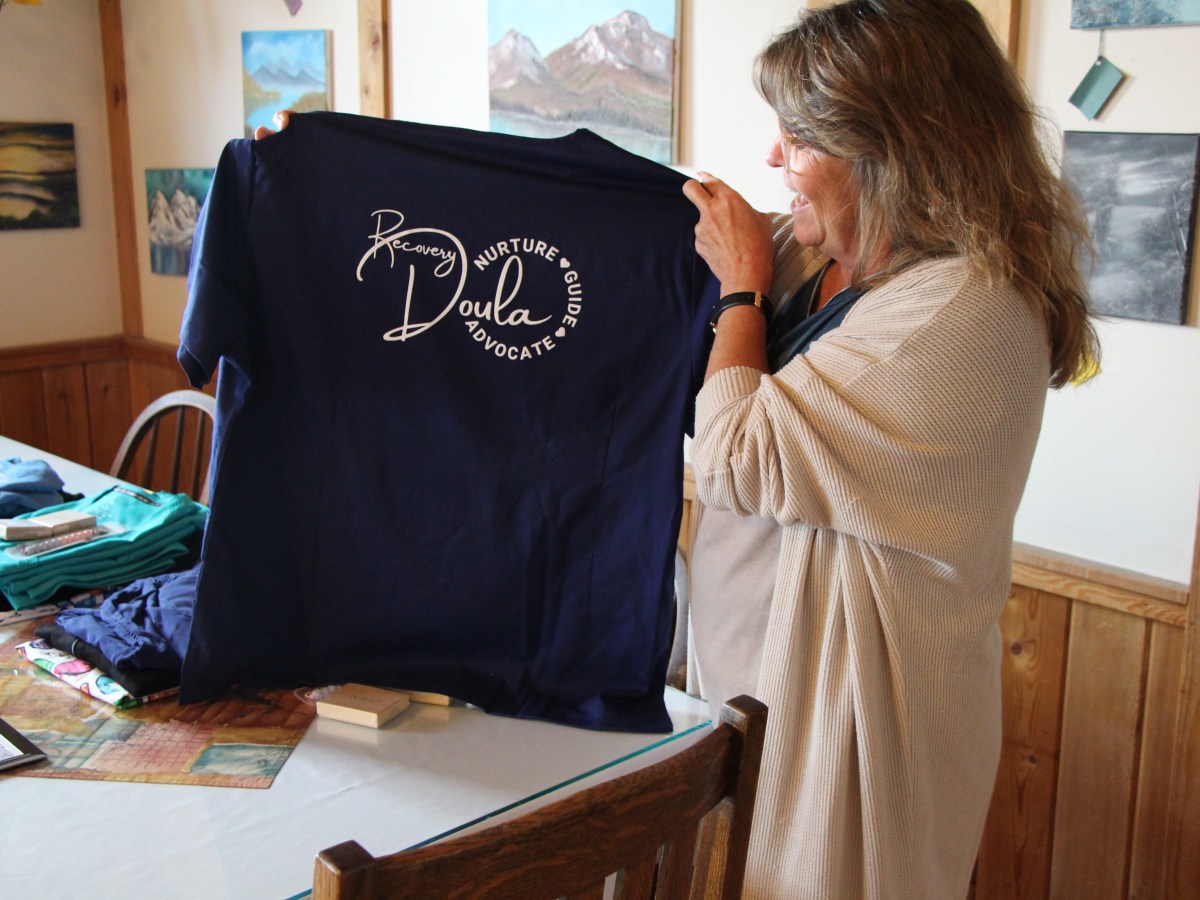Public health advocates in Montana are endorsing a boost in federal grants for maternal home-visiting programs and asking Biden administration officials to continue funding services for Montanans who are pregnant and parenting young children.
Health Resources and Services Administration head Carole Johnson appeared in Bozeman Tuesday to tout $5.4 million in grants for home visiting that will be available to Montana in the upcoming fiscal year, a roughly $400,000 increase over the current allocation. Annual grants for states will continue to grow over the next few years, Johnson said, based on congressional reauthorization of the program in 2022.
Johnson framed Tuesday’s roundtable discussion as an opportunity to hear from community stakeholders about what needs are currently being addressed in Montana with federal funding and what issues need more attention from health officials.
“[We want to understand] how we can leverage the work that we’re doing to make sure that every dollar and every policy that we put forward … everything you as the state are supporting, everything the counties are supporting, are all driving toward the same goal, which is the health and safety and well-being of moms and babies across the state,” Johnson said.
Montana is one of 11 states Johnson and other HRSA officials are visiting as part of a Biden administration maternal health initiative tour. HRSA representatives are meeting with state and local officials to discuss, among other topics, maternal mortality rates and health disparities, particularly among Native American and Black mothers.
“This is a problem across the spectrum,” Johnson said. “When we walked in, the Biden-Harris administration, and looked at the numbers, we said, ‘We have to do better by families.’”
According to data compiled by the Centers for Disease Control and Prevention from 2018 to 2022, Montana’s maternal mortality rate was 30.5 per 100,000 live births, about on par with the national figure for the same period.
A CDC analysis of 2020 pregnancy-related mortality data compiled from 38 states, including Montana, found that 47% of deaths occurred between seven days and one year after birth. Overall, about 84% of deaths in the study were determined to be preventable. Mental health conditions, including substance use disorder, were an underlying cause in more than 22% of the deaths.
In the 19 Montana counties with home-visiting programs supported by federal HRSA grants, 97% of enrolled participants in 2022 were screened for depression within three months of joining the program.
County public health workers and parents on Tuesday told Johnson and other HRSA officials how the home-visiting programs in Montana helped new moms navigate the hurdles of pregnancy and caring for infants and young children during their first days, months and years of life.
“I feel like I was in survival mode for a good 10 months,” said Clayleen Kors, a Belgrade resident who said she went into labor with her first child at 29 weeks, almost two months before her due date. “The experience of having a premie and especially going into labor at seven and a half months is super isolating and it [took] a big toll on my mental health.”
RELATED
How ‘recovery doulas’ are helping Montanans navigate addiction and parenthood
Drugs, alcohol and mental illness pose significant risks to maternal and early childhood health, nationwide and in Montana. The recovery doula program, led by One Health, seeks to prevent negative outcomes by combining two types of health care professional: peer support specialists and birth doulas.
Kors recalled feeling isolated and anxious as she transitioned to caring for her premature baby at home after their stressful eight-week hospital stay. One day, she said, the phone rang. The Gallatin County Health Department told her she had been referred to their home-visiting program, and paired her with a trained nurse for every question she had about parenting: how to breastfeed a child born premature, important developmental milestones, how to manage her own anxiety, and many more.
“They reached out to me and came to me,” Kors said. In the years since, her home-visiting nurse has provided a “constant line of communication.”
“She has seen my son grow more than some of my family members. And she has seen me grow as a mom,” Kors said.
Other local health officials said HRSA grants had helped them expand existing services. Amie Gatterdam, who oversees parental engagement programs for Gallatin County, said the health department was preparing to offer universal home visiting for every resident who delivers a child in the county.
“We truly believe that every single person who has a baby could use a little extra help,” Gatterdam said.
Montana speakers referenced other programs they said were essential for supporting maternal health and early childhood wellness, including peer support specialists, doulas who are specially trained to help parents navigate substance use disorders, and workforce strategies to train and employ more nurse midwives and other health care workers across the state.
Montana’s state medical director, Dr. Doug Harrington, also referenced the importance of Medicaid expansion in covering health services for pregnant and parenting Montanans. While the state’s expanded Medicaid program is set to sunset in 2025, Republican Gov. Greg Gianforte has said he supports reauthorizing a version of the program during the upcoming legislative session. Harrington reiterated the state’s stance during Tuesday’s event.
“Everyone here would like to see Medicaid expansion,” Harrington said. “It’s clearly on the docket.”
LATEST STORIES
Federal loan repayment plan partially blocked by courts
Republican Attorney General Austin Knudsen welcomed a federal court injunction this week temporarily blocking the final phase of President Joe Biden’s latest plan to rein in student debt.
Judge strikes down Montana law defining sex as only male or female for procedural reasons
A judge struck down a Montana law that defined “sex” in state law as only male or female, finding that it was unconstitutional.
Planned Parenthood says it will spend $40 million on abortion rights ahead of November’s election
Planned Parenthood will spend $40 million ahead of November’s elections to bolster President Joe Biden and leading congressional Democrats, betting that voters angry at Republican-led efforts to further restrict access to abortion can be the difference in key races around the country — including Montana’s Senate race.


